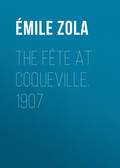
Эмиль Золя
Abbe Mouret's Transgression
BOOK III
I
When Abbe Mouret had said the Pater, he bowed to the altar, and went to the Epistle side. Then he came down, and made the sign of the cross over big Fortune and Rosalie, who were kneeling, side by side, before the altar-rails.
‘Ego conjungo vos in matrimonium, in nomine Patris, et Filii, et Spiritus Sancti.’
‘Amen,’ responded Vincent, who was serving the mass, and glancing curiously at his big brother out of the corner of his eye.
Fortune and Rosalie bent their heads, affected by some slight emotion, although they had nudged each other with their elbows when they knelt down, by way of making one another laugh. But Vincent went to get the basin and the sprinkler. Fortune placed the ring in the basin, a thick ring of solid silver. When the priest had blessed it, sprinkling it crosswise, he returned it to Fortune, who slipped it upon Rosalie’s finger. Her hand was still discoloured with grass-stains, which soap had not been able to remove.
‘In nomine Patris, et Filii, et Spiritus Sancti,’ Abbe Mouret murmured again, giving them a final benediction.
‘Amen,’ responded Vincent.
It was early morning. The sun was not yet shining through the big windows of the church. Outside one could hear the noisy twittering of the sparrows in the branches of the service tree, whose foliage shot through the broken panes. La Teuse, who had not previously had time to clean the church, was now dusting the altar, craning up on her sound leg to wipe the feet of the ochre and lake-bedaubed Christ, and arranging the chairs as quietly as possible; all the while bowing and crossing herself, and following the service, but not omitting a single sweep of her feather broom. Quite alone, at the foot of the pulpit, was mother Brichet, praying in a very demonstrative fashion. She kept on her knees, and repeated the prayers in so loud a whisper that it seemed as if a swarm of bluebottles had taken possession of the nave.
At the other end of the church near the confessional, Catherine held an infant in swaddling clothes. As it began to cry, she turned her back upon the altar, and tossed it up, and amused it with the bell-rope, which dangled just over its nose.
‘Dominus vobiscum,’ said the priest, turning round, and spreading out his hands.
‘Et cum spiritu tuo,’ responded Vincent.
At that moment three big girls came into the church. They were too shy to go far up, though they jostled one another to get a better view of what was going on. They were three friends of Rosalie, who had dropped in for a minute or two on their way to the fields, curious as they were to hear what his reverence would say to the bride and bridegroom. They had big scissors hanging at their waists. At last they hid themselves behind the font, where they pinched each other and twisted themselves about, while trying to choke their bursts of laughter with their clenched fists.
‘Well,’ whispered La Rousse, a finely built girl, with copper-coloured skin and hair, ‘there won’t be any scrimmage to get out of church when it’s all over.’
‘Oh! old Bambousse is quite right,’ murmured Lisa, a short dark girl, with gleaming eyes; ‘when one has vines, one looks after them. Since his reverence so particularly desired to marry Rosalie, he can very well do it all alone.’
The other girl, Babet, who was humpbacked, tittered. ‘There’s mother Brichet,’ she said; ‘she is always here. She prays for the whole family. Listen, do you hear how she’s buzzing? All that will mean something in her pocket. She knows very well what she is about, I can tell you.’
‘She is playing the organ for them,’ retorted La Rousse.
At this all three burst into a laugh. La Teuse, in the distance, threatened them with her broom. At the altar, Abbe Mouret was taking the sacrament. As he went from the Epistle side towards Vincent, so that the water of ablution might be poured upon his thumb and fore-finger, Lisa said more softly: ‘It’s nearly over. He will begin to talk to them directly.’
‘Yes,’ said La Rousse, ‘and so big Fortune will still be able to go to his work, and Rosalie won’t lose her day’s pay at the vintage. It is very convenient to be married so early in the morning. He looks very sheepish, that big Fortune.’
‘Of course,’ murmured Babet. ‘It tires him, keeping so long on his knees. You may be sure that he has never knelt so long since his first communion.’
But the girls’ attention was suddenly distracted by the baby which Catherine was dangling in her arms. It wanted to get hold of the bell-rope, and was quite blue with rage, frantically stretching out its little hands and almost choking itself with crying.
‘Ah! so the youngster is there,’ said La Rousse.
The baby now burst into still louder wailing, and struggled like a little Imp.
‘Turn it over on its stomach, and let it suck,’ said Babet to Catherine.
Catherine lifted up her head, and began to laugh, with the shamelessness of a little minx. ‘It’s not at all amusing,’ she said, giving the baby a shake. ‘Be quiet, will you, little pig! My sister plumped it down on my knees.’
‘Naturally,’ said Babet, mischievously. ‘You could scarcely have expected her to give the brat to Monsieur le Cure to nurse.’
At this sally, La Rousse almost fell over in a fit of laughter. She leaned against the wall, holding her sides with her hands. Lisa threw herself against her, and attempted to soothe her by pinching her back and shoulders; while Babet laughed with a hunchback’s laugh, which grated on the ear like the sound of a saw.
‘If it hadn’t been for the little one,’ she continued, ‘Monsieur le Cure would have lost all use for his holy water. Old Bambousse had made up his mind to marry Rosalie to young Laurent, of Figuieres.’
However, the girls’ merriment and their chatter now came to an end, for they saw La Teuse limping furiously towards them. At this the three big hussies felt alarmed, stepped back, and subsided into sedateness.
‘You worthless things!’ hissed La Teuse. ‘You come to talk a lot of filth here, do you? Aren’t you ashamed of yourself, La Rousse? You ought to be there, on your knees, before the altar, like Rosalie. I will throw you outside if you stir again. Do you hear?’
La Rousse’s copper cheeks were tinged with a rising blush, and Babet glanced at her and tittered.
‘And you,’ continued La Teuse, turning towards Catherine, ‘just you leave that baby alone. You are pinching it on purpose to make it scream. Don’t tell me you are not. Give it to me.’
She took the child, hushed it in her arms for a moment, and then laid it upon a chair, where it went to sleep, peacefully like a cherub. The church then subsided into solemn quietness, disturbed only by the chattering of the sparrows on the rowan tree outside. At the altar, Vincent had carried the missal to the right again, and Abbe Mouret had just folded the corporal and slipped it within the burse. He was now saying the concluding prayers with a solemn earnestness, which neither the screams of the baby nor the giggling of the three girls had been able to disturb. He seemed to hear nothing of them, but to be wholly absorbed in the prayers which he was offering up to Heaven for the happiness of the pair whose union he had just blessed. The sky that morning was grey with a hazy heat, which veiled the sun. Through the broken windows a russet vapour streamed into the church, betokening a stormy day. Along the walls the gaudily coloured pictures of the Stations of the Cross displayed their red, blue, and yellow patches; at the bottom of the nave the dry woodwork of the gallery creaked and strained; and under the doorway the tall grass by the steps thrust ripening straw, all alive with little brown grasshoppers. The clock, in its wooden case, made a whirring noise, as though it were some consumptive trying to clear his throat, and then huskily struck half-past six.
‘Ite, missa est,’ said the priest, turning round to the congregation.
‘Deo gratias,’ responded Vincent.
Then, having kissed the altar, Abbe Mouret once more turned round, and murmured over the bent heads of the newly married pair the final benediction: ‘Deus Abraham, Deus Isaac, et Deus Jacob vobiscum sit’ – his voice dying away into a gentle whisper.
‘Now, he’s going to address them,’ said Babet to her friends.
‘He is very pale,’ observed Lisa. ‘He isn’t a bit like Monsieur Caffin, whose fat face always seemed to be on the laugh. My little sister Rose says that she daren’t tell him anything when she goes to confess.’
‘All the same,’ murmured La Rousse, ‘he’s not ugly. His illness has aged him a little, but it seems to suit him. He has bigger eyes, and lines at the corners of his mouth which make him look like a man. Before he had the fever, he was too much like a girl.’
‘I believe he’s got some great trouble,’ said Babet. ‘He looks as though he were pining away. His face is deadly pale, but how his eyes glitter! When he drops his eyelids, it is just as though he were doing it to extinguish the fire in his eyes.’
La Teuse again shook her broom at them. ‘Hush!’ she hissed out, so energetically that it seemed as if a blast of wind had burst into the church.
Meantime Abbe Mouret had collected himself, and he began, in a rather low voice:
‘My dear brother, my dear sister, you are joined together in Jesus. The institution of marriage symbolises the sacred union between Jesus and His Church. It is a bond which nothing can break; which God wills shall be eternal, so that man may not sever those whom Heaven has joined. In making you flesh of each other’s flesh, and bone of each other’s bone, God teaches you that it is your duty to walk side by side through life, a faithful couple, along the paths which He, in His omnipotence, appoints for you. And you must love each other with God-like love. The slightest ill-feeling between you will be disobedience to the Creator, Who has joined you together as a single body. Remain, then, for ever united, after the likeness of the Church, which Jesus has espoused, in giving to us all His body and blood.’
Big Fortune and Rosalie sat listening, with their noses peaked up inquisitively.
‘What does he say?’ asked Lisa, who was a little deaf.
‘Oh! he says what they all say,’ answered La Rousse. ‘He has a glib tongue, like all the priests have.’
Abbe Mouret went on with his address, his eyes wandering over the heads of the newly wedded couple towards a shadowy corner of the church. And by degrees his voice became more flexible, and he put emotion into the words he spoke, words which he had formerly learned by heart from a manual intended for the use of young priests. He had turned slightly towards Rosalie, and whenever his memory failed him, he added sentences of his own:
‘My dear sister, submit yourself to your husband, as the Church submits itself to Jesus. Remember that you must leave everything to follow him, like a faithful handmaiden. You must give up father and mother, you must cleave only to your husband, and you must obey him that you may obey God also. And your yoke will be a yoke of love and peace. Be his comfort, his happiness, the perfume of his days of strength, the support of his days of weakness. Let him find you, as a grace, ever by his side. Let him have but to reach out his hand to find yours grasping it. It is thus that you will step along together, never losing your way, and that you will meet with happiness in the carrying out of the divine laws. Oh! my dear sister, my dear daughter, your humility will hear sweet fruit; it will give birth to all the domestic virtues, to the joys of the hearth, and the prosperity that attends a God-fearing family. Have for your husband the love of Rachel, the wisdom of Rebecca, the constant fidelity of Sarah. Tell yourself that a pure life is the source of all happiness. Pray to God each morning that He may give you strength to live as a woman who respects her responsibilities and duties; for the punishment you would otherwise incur is terrible: you would lose your love. Oh! to live loveless, to tear flesh from flesh, to belong no more to the one who is half of your very self, to live on in pain and agony, bereft of the one you have loved! In vain would you stretch out your arms to him; he would turn away from you. You would yearn for happiness, but you would find in your heart nothing but shame and bitterness. Hear me, my daughter, it is in your own conduct, in your obedience, in your purity, in your love, that God has established the strength of your union.’
As Abbe Mouret spoke these words, there was a burst of laughter at the other end of the church. The baby had just woke up on the chair where La Teuse had laid it. But it was no longer in a bad temper. Having kicked itself free of its swaddling clothes, it was laughing merrily, and shaking its rosy little feet in the air. It was the sight of these little feet that made it laugh.
Rosalie, who was beginning to find the priest’s address rather tedious, turned her head to smile at the child. But, when she saw it kicking about on the chair, she grew alarmed, and cast an angry look at Catherine.
‘Oh! you can look at me as much as you like,’ said Catherine. ‘I’m not going to take it any more. It would only begin to cry again.’
And she turned aside to ferret in an ant-hole at a corner of one of the stone flags under the gallery.
‘Monsieur Caffin didn’t talk so long,’ now remarked La Rousse. ‘When he married Miette, he just gave her two taps on the cheek and told her to be good.’
My dear brother,’ resumed Abbe Mouret, turning towards big Fortune, ‘it is God who, to-day, gives you a companion, for He does not wish that man should live alone. But, if He ordains that she shall be your servant, He demands from you that you shall be to her a master full of gentleness and love. You will love her, because she is part of your own flesh, of your own blood, and your own bone. You will protect her, because God has given you strong arms only that you may stretch them over her head in the hour of danger. Remember that she is entrusted to you, and that you cannot abuse her submission and weakness without sin. Oh! my dear brother, what proud happiness should be yours! Henceforth, you will no longer live in the selfish egotism of solitude. At all hours you will have a lovable duty before you. There is nothing better than to love, unless it be to protect those whom we love. Your heart will expand; your manly strength will increase a hundredfold. Oh! to be a support and stay, to have a love given into your keeping, to see a being sink her existence in yours and say, “Take me and do with me what you will! I trust myself wholly to you!” And may you be accursed if you ever abandon her! It would be a cowardly desertion which God would assuredly punish. From the moment she gives herself to you, she becomes yours for ever. Carry her rather in your arms, and set her not upon the ground until it be certain that she will be there in safety. Give up everything, my dear brother – ’
But here the Abbe’s voice faltered, and only an indistinct murmur came from his lips. He had quite closed his eyes, his face was deathly white, and his voice betokened such deep distress that big Fortune himself shed tears without knowing why.
‘He hasn’t recovered yet,’ said Lisa. ‘It is wrong of him to fatigue himself. See, there’s Fortune crying!’
‘Men are softer-hearted than women,’ murmured Babet.
‘He spoke very well, all the same,’ remarked La Rousse. ‘Those priests think of a lot of things that wouldn’t occur to anybody else.’
‘Hush!’ cried La Teuse, who was already making ready to extinguish the candles.
But Abbe Mouret still stammered on, trying to utter a few more sentences. ‘It is for this reason, my dear brother, my dear sister, that you must live in the Catholic Faith, which alone can ensure the peace of your hearth. Your families have taught you to love God, to pray to Him every morning and evening, to look only for the gifts of His mercy – ’
He was unable to finish. He turned round, took the chalice off the altar, and retired, with bowed head, into the vestry, preceded by Vincent, who almost let the cruets and napkin fall, in trying to see what Catherine might be doing at the end of the church.
‘Oh! the heartless creature!’ said Rosalie, who left her husband to go and take her baby in her arms. The child laughed. She kissed it, and rearranged its swaddling clothes, while threatening Catherine with her fist. ‘If it had fallen,’ she cried out, ‘I would have boxed your ears for you, nicely.’
Big Fortune now came slouching along. The three girls stepped towards him, with compressed lips.
‘See how proud he is,’ murmured Babet to the others. ‘He is sure of inheriting old Bambousse’s money now. I used to see him creeping along every night under the little wall with Rosalie.’
Then they giggled, and big Fortune, standing there in front of them, laughed even louder than they did. He pinched La Rousse, and let Lisa jeer at him. He was a sturdy young blood, and cared nothing for anybody. The priest’s address had annoyed him.
‘Hallo! mother, come on!’ he called in his loud voice. But mother Brichet was begging at the vestry door. She stood there, tearful and wizen, before La Teuse, who was slipping some eggs into the pocket of her apron. Fortune didn’t seem to feel the least sense of shame. He just winked and remarked: ‘She is a knowing old card, my mother is. But then the Cure likes to see people at mass.’
Meanwhile, Rosalie had grown calm again. Before leaving the church, she asked Fortune if he had begged the priest to come and bless their room, according to the custom of the country. So Fortune ran off to the vestry, striding heavily through the church, as if it were a field. He soon reappeared, shouting that his reverence would come. La Teuse, who was scandalised at the noise made by all these people, who seemed to think themselves in a public street, gently clapped her hands, and pushed them towards the door.
‘It is all over,’ said she; ‘go away and get to your work.’
She thought they had all gone, when her eye caught sight of Catherine, whom Vincent had joined. They were bending anxiously over the ants’ nest. Catherine was poking a long straw into the hole so roughly, that a swarm of frightened ants had rushed out upon the floor. Vincent declared, however, that she must get her straw right to the bottom if she wished to find the queen.
‘Ah! you young imps!’ cried La Teuse, ‘what are you after there? Can’t you leave the poor little things alone? That is Mademoiselle Desiree’s ants’ nest. She would be nicely pleased if she saw you!’
At this the children promptly took to their heels.
II
Abbe Mouret, now wearing his cassock but still bareheaded, had come back to kneel at the foot of the altar. In the grey light that streamed through the window, his tonsure showed like a large livid spot amidst his hair; and a slight quiver, as if from cold, sped down his neck. With his hands tightly clasped he was praying earnestly, so absorbed in his devotions that he did not hear the heavy footsteps of La Teuse, who hovered around without daring to disturb him. She seemed to be grieved at seeing him bowed down there on his knees. For a moment, she thought that he was in tears, and thereupon she went behind the altar to watch him. Since his return, she had never liked to leave him in the church alone, for one evening she had found him lying in a dead faint upon the flagstones, with icy lips and clenched teeth, like a corpse.
‘Come in, mademoiselle!’ she said to Desiree, who was peeping through the vestry-doorway. ‘He is still here, and he will lay himself up. You know you are the only person that he will listen to.’
‘It is breakfast-time,’ she replied softly, ‘and I am very hungry.’
Then she gently sidled up to the priest, passed an arm round his neck, and kissed him.
‘Good morning, brother,’ she said. ‘Do you want to make me die of hunger this morning?’
The face he turned upon her was so intensely sad, that she kissed him again on both his cheeks. He was emerging from agony. Then, on recognising her, he tried to put her from him, but she kept hold of one of his hands and would not release it. She would scarcely allow him to cross himself, but insisted upon leading him away.
‘Come! Come! for I am very hungry. You must be hungry too.’
La Teuse had laid out the breakfast beneath two big mulberry trees, whose spreading branches formed a sheltering roof at the bottom of the little garden. The sun, which had at last succeeded in dissipating the stormy-looking vapours of early morning, was warming the beds of vegetables, while the mulberry-trees cast a broad shadow over the rickety table, on which were laid two cups of milk and some thick slices of bread.
‘You see how nice it looks,’ said Desiree, delighted at breakfasting in the fresh air.
She was already cutting some of the bread into strips, which she ate with eager appetite. And as she saw La Teuse still standing in front of them, she said, ‘Why don’t you eat something?’
‘I shall, presently,’ the old servant answered. ‘My soup is warming.’
Then, after a moment’s silence, looking with admiration at the girl’s big bites, she said to the priest: ‘It is quite a pleasure to see her. Doesn’t she make you feel hungry, Monsieur le Cure? You should force yourself.’
Abbe Mouret smiled as he glanced at his sister. ‘Yes, yes,’ he murmured; ‘she gets on famously, she grows fatter every day.’
‘That’s because I eat,’ said Desiree. ‘If you would eat you would get fat, too. Are you ill again? You look very melancholy. I don’t want to have it all over again, you know. I was so very lonely when they took you away to cure you.’
‘She is right,’ said La Teuse. ‘You don’t behave reasonably, Monsieur le Cure. You can’t expect to be strong, living, as you do, on two or three crumbs a day, as though you were a bird. You don’t make blood; and that’s why you are so pale. Don’t you feel ashamed of keeping as thin as a lath when we are so fat; we who are only women? People will begin to think that we gobble up everything and leave you nothing but the empty plates.’
Then both La Teuse and Desiree, brimful of health and strength, scolded him affectionately. His eyes seemed very large and bright, but empty, expressionless. He was still gently smiling.
‘I am not ill,’ he said; ‘I have nearly finished my milk.’ He had swallowed two mouthfuls of it, but had not touched the bread.
‘The animals, now,’ said Desiree, thoughtfully, ‘seem to get on much more comfortably than we do. The fowls never have headaches, have they? The rabbits grow as fat as ever one wants them to be. And you never saw my pig looking sad.’
Then, turning towards her brother, she went on with an air of rapture:
‘I have named it Matthew, because it is so like that fat man who brings the letters. It is growing so big and strong. It is very unkind of you to refuse to come and look at it as you always do. You will come to see it some day, won’t you?’
While she was thus talking she had laid hold of her brother’s share of bread, and was eating away at it. She had already finished one piece, and was beginning the second, when La Teuse became aware of what she was doing.
‘That doesn’t belong to you, that bread! You are actually stealing his food from him now!’
‘Let her have it,’ said Abbe Mouret, gently. ‘I shouldn’t have touched it myself. Eat it all, my dear, eat it all.’
For a moment Desiree fell into confusion, with her eyes fixed upon the bread, whilst she struggled to check her rising tears. Then she began to laugh, and finished the slice.
‘My cow,’ said she, continuing her remarks, ‘is never as sad as you are. You were not here when uncle Pascal gave her to me, on the promise that I would be a good girl, or you would have seen how pleased she was when I kissed her for the first time.’
She paused to listen. A cock crowed in the yard, and a great uproar followed, with flapping of wings and cackling, grunting, and hoarse cries as if the whole yard were in a state of commotion.
‘Ah! you know,’ resumed Desiree, clapping her hands, ‘she must be in calf now. I took her to the bull at Beage, three leagues from here. There are very few bulls hereabouts, you know.’
La Teuse shrugged her shoulders, and glanced at the priest with an expression of annoyance.
‘It would be much better, mademoiselle,’ said she, ‘if you were to go and quiet your fowls. They all seem to be murdering one another.’
Indeed, the uproar in the yard had now become so great that the girl was already hurrying off with a great rustling of her petticoats, when the priest called her back. ‘The milk, my dear; you have not finished the milk.’
He held out his cup to her, which he had scarcely touched. And she came back and drank the milk without the slightest scruple, in spite of La Teuse’s angry look. Then she again set off for the poultry-yard, where they soon heard her reducing the fowls to peace and order. She had, perhaps, sat down in the midst of them, for she could be heard gently humming as though she were trying to lull them to sleep.







